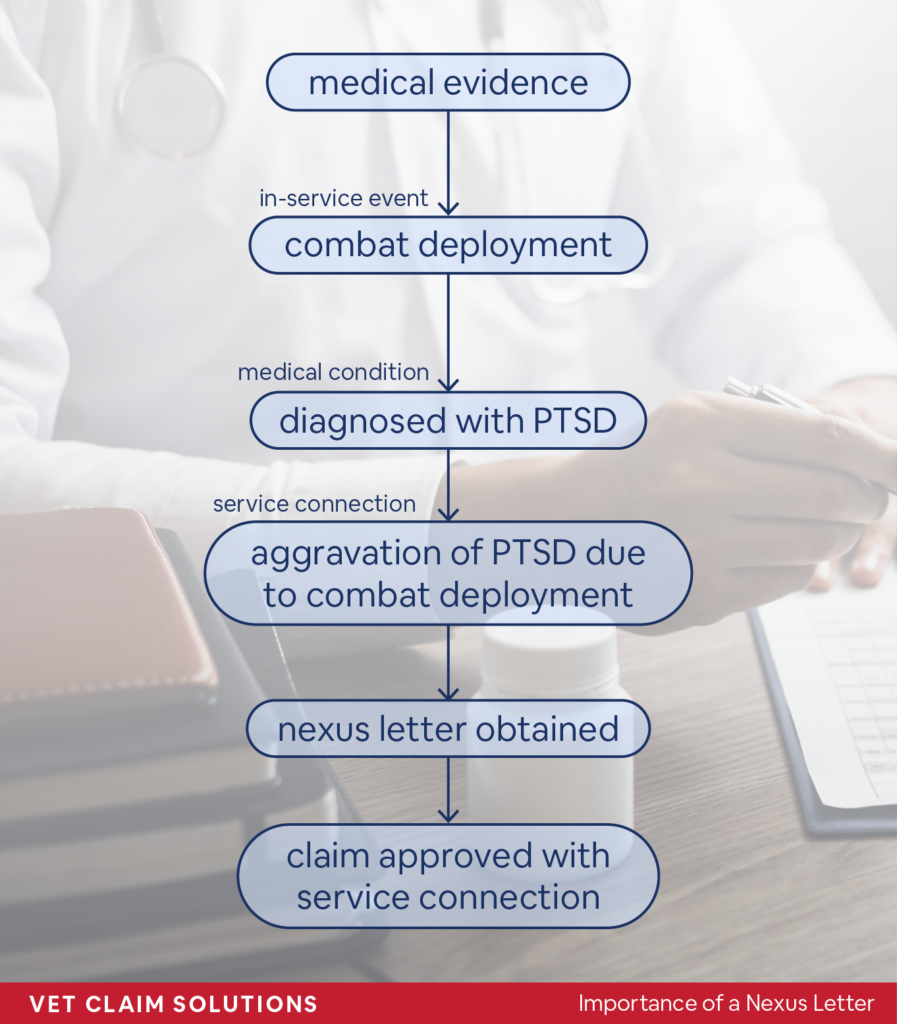When it comes to making a case for receiving VA disability benefits, one of the most important documents that you can have is a nexus letter. A nexus letter is written by qualified medical professionals and explains the correlation between your injury or illness and your military time. It plays an essential role in helping prove your condition should be service connected.
This blog post will discuss the importance of having a nexus letter for your disability claim and how to obtain one. Read on to learn more!

A Medical Nexus Letter Defined
A nexus letter is a powerful tool that can make all the difference in getting approval or denial on a VA disability claim. It should be written by a qualified medical professional and provide evidence of your injury or illness related to your military service.
The letter should contain information about the veteran’s current medical condition, treatment received, and medical records supporting their claim. Additionally, the letter should include an opinion from the doctor regarding how these facts relate to a service-connected disability.
In many cases, submitting a nexus letter can be a key factor in getting approval for benefits. However, it is important to note that it may not always be necessary to receive VA disability benefits.
For veterans seeking disability benefits, having a nexus letter is an invaluable resource. It can help build a stronger case for eligibility and increase the chances of getting approved. Suppose you are considering filing for disability through the VA and may need a nexus letter. In that case, it’s best to consult a qualified medical professional to discuss your situation and determine the best action.
Four Components of a Strong Nexus Letter
Let’s dive into what constitutes a strong nexus letter so that you can ensure you have all the necessary components for success in your claim. Replica Breitling navitimer
1) Provider Credentials
It is important to ensure that your provider has the proper credentials when writing a nexus letter. The medical professional can include a physician (medical doctor or osteopath doctor) who specializes in treating conditions related to your disability or have experience working with veterans who have similar disabilities as yours. In addition to a physician, physician assistants (PAs) and nurse practitioners who are familiar with your medical history and medical condition can also author a nexus letter. The more well-versed the health professionals are in treating veterans, the better because this will increase the credibility of their opinion.

2) Review of Medical Records Related to the Claim
Your provider should review all relevant medical records related to your claim before issuing an opinion on whether or not there is a connection between your current condition and military service. This includes reviewing any medical care you received during active duty, such as hospitalizations, exams, lab tests, etc., and any documentation after discharge that relates directly to the disability for which you are seeking benefits. This review process should be thorough and detailed for it to be effective in proving service connection.

3) State Probability of Service Connection
For the nexus letter to be effective, it must include an opinion from the provider stating how likely it is that your current condition was caused or worsened by military service. This probability should fall within certain parameters set forth by the VA.
For example, if there is at least a 50% likelihood of service connection, this could support awarding benefits for the disability in question. It is essential for this portion of the nexus letter to clearly state what probability has been established based on the evidence presented by medical records and other sources of information related to the disability itself.

4) The Rationale of Medical Opinion
The final component of a strong nexus letter involves providing a rationale behind why there is a probable connection between the current condition and military service based on reviewed evidence from medical records and other sources of information related to disability being claimed for benefits.
It should explain how each piece of evidence supports or disproves any possible connections between the current condition and time spent serving the country in the armed forces; this will help VA understand why there is such a high likelihood that disability occurred due to time spent serving the country instead some other cause unrelated event occurring after discharge from armed forces duty happened (such as car accident).

Do I Need a Nexus Letter?
A Nexus Letter is not mandatory for veterans; however, there are certain circumstances where obtaining one can be beneficial. Here are three reasons why a veteran might want to get a Nexus Letter:

Disability Diagnosed During Service
If your disability was diagnosed during service and is documented in your military medical records (Service Treatment Records), a Nexus Letter may not be necessary. However, it’s still important to ensure that your disability symptoms are properly documented in medical records.

Not Diagnosed During Service
If your disability was not diagnosed during service or there are no documented symptoms in your military medical records, obtaining a Nexus Letter is highly recommended. This provides evidence that the disability did indeed exist during service.

Previously Denied Condition
Obtaining a Nexus Letter is highly recommended if you’re attempting to service-connect a previously denied VA claim or file for a secondary service connection. This provides powerful evidence to support your claim and increases the chances of it being approved. In the case of a secondary service connection, a Nexus Letter can help demonstrate that the new disability is “proximately due to” or “aggravated by” a current service-connected disability.

Pursuing a Secondary Service-Connected Condition
Obtaining a Nexus Letter is essential if you want to pursue a secondary service-connected condition. This letter can demonstrate that the new disability is “proximately due to” or “aggravated by” a current service-connected disability. For example, chronic pain secondary to post-traumatic stress disorder (PTSD).
How to Make a Nexus Letter More Effective
The provider should state that the disability is related to an event, injury, or illness during service. They should include details such as when it occurred and what symptoms were presented.
It is important to note that the provider does not have to prove your disability was caused by service. Instead, they must establish a nexus between your current medical condition and an event during service or exposure to wartime conditions.
The letter should be clear and easy to understand. The language used should be precise and accurate. It should include detailed evidence and supporting documentation to bolster the doctor’s findings.
The provider does not need to draw an absolute conclusion as to the nexus between your disability and your military service. It is adequate for VA disability rating purposes if it meets the level “it is at least as likely as not.”
Finally, the letter should be dated and signed by the provider. This shows that it is a timely document, written with care and consideration for your case.
By following these steps, you can ensure that any nexus letter prepared on your behalf will be effective in helping to obtain the benefits you are due.
Do You Have Questions on Your Claim or Nexus Letters?
Filing a disability claim with the VA can be confusing and stressful. If you still have questions about understanding when and how to use a Nexus Letter for your veteran’s disability claim, don’t hesitate to reach out to Vet Claim Solutions. Our team will help you to develop a strategy and, when needed, obtain quality nexus letters for your VA disability claim, increasing your chance of having a successful outcome.


